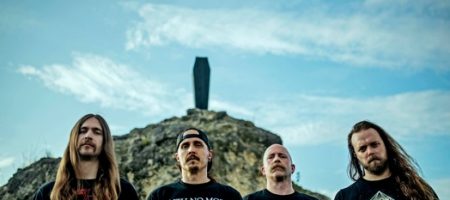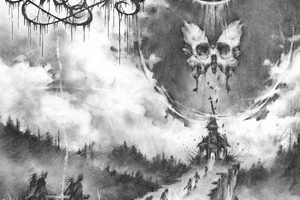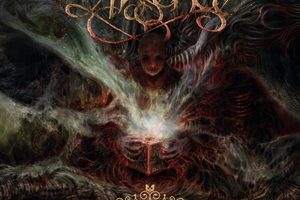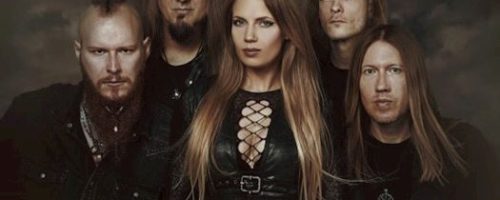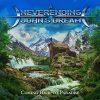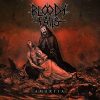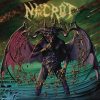The Absence – Long Live Melodic Death Metal
Tuesday, 17th April 2018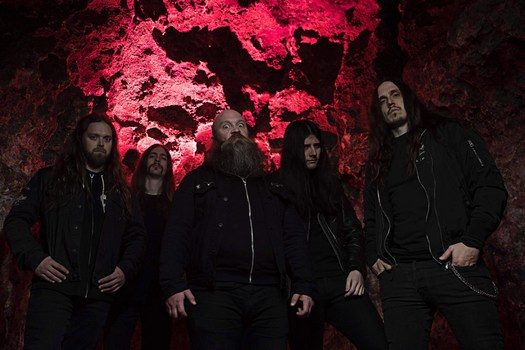
Jumping into the fray back in the mid-2000s, a time when the American metal scene was fixated on the metalcore movement, The Absence unveiled their first slab of clearly European-inspired melodic death metal. Into the Grave was thrashy, aggressive, and full of guitar heroics, owing much more to the Gothenburg movement than their North American contemporaries. It set the band apart, and the follow-up Riders of the Plague solidified their status as a go-to act within the genre as it upped the ante in every way.
Admittedly, though a solid release, there was less fanfare accompanying their third release, Enemy Unbound, and the band thereafter parted ways with Metal Blade Records. A few singles and a Indiegogo later, the band seemed to fall off the planet for a bit. But after some restructuring, The Absence has returned with a new label and record in hand. A Gift for the Obsessed shows them doing exactly what they do best – vicious and snarling melodic death metal, complete with plenty of catchy/soaring leadwork and melodies. We figured it was high-time to speak with vocalist Jamie Stewart about what’s been happening in the band over the last eight years (including band changes and the Indiegogo campaign), thoughts about being torchbearers for melodic death metal, and industry changes over the years.
Dead Rhetoric: First off, congrats on the new album. It’s great to see you guys back!
Jamie Stewart: It’s been a real tumultuous 8 years to say the least. But a lot of cool things happened – some touring, we did the singles, but we just kept butting heads with former members on which way we should go for the fourth record. Some people wanted to go in more of a, dare I say, mainstream avenue. It happens a lot, especially in American metal. Especially after a couple of records, it’s like, “Ok, we’ve been doing this for a while.” Everyone has to be satisfied. So that’s what it was, in general, just musical preferences – broadening them or just going down different avenues. Sometimes certain musical things just fall by the wayside after some years – some people just don’t want to play death metal anymore. To each their own, so they say.
But the rest of us did, and once Taylor [Nordberg], Jeramie [Kling], and I really set our sights after Patrick [Pintavalle] quit, and Taylor wrote this record. It was him and Jeramie in the practice space to start. They did the production and the pre-production, so it was a really fluid thing once we got the gears going. Crap happens and spirits get low so sometimes it takes a second for it to get back into motion. Once it did, this record started pouring out, and every song was better and better. We are digging it. We all still listen to it and say, “Wow, we made this? [laughs] We still got it after all these years.”
Dead Rhetoric: That’s funny – I know there were a lot of change over in those years, but when you hear A Gift for the Obsessed, it still sounds like The Absence.
Stewart: That was actually a big fear for us. Obviously we are not opposed to progression – it’s all about perpetual motion with us and we have tried to make that our thing no matter what. Clean vocals were a really big thing with us. It was something that Pat and I kind of clashed on a little bit. He did all of the clean vocals for the band, and we released “Oceans,” which was the last thing we released with him. It was a cool song, because it was a departure for us, but I was in the forefront – I had never been opposed to clean vocals, but I just never wanted to be in a band that was doing the ‘good cop/bad cop’ thing that was so prevalent in American metal, and metal in general now.
I like bands like that – I really enjoy Soilwork’s A Predator’s Portrait, when they brought in the clean vocals but it was still melodic death metal and very tastefully done. There’s a lot of bands that have done that, who splice it in and it’s cool. That’s what I prefer, salt and pepper it in and mix it into the cake – even it out. I just didn’t want to be a predictable band, because I’m sure we are predictable to somebody who listens to melodic death metal. “Oh, there’s the melodic part!” That’s predictable.
We definitely have a sound and a style. Maybe it’s because we are an American band playing a style of music that you would normally [associate with Europe]. There’s bands in America that definitely do that kind of thing, but I think that we carry a torch a little bit. We were never a metalcore band. There’s riffs that you might be able to take in a certain context as metalcore-ish, but we definitely set out with a sound in mind. We wanted to be a metal band. We didn’t want to be a melodic metal band in America, with hardcore breakdowns or anything. A lot of bands do that – Killswitch [Engage], Shadows Fall did some of that, As I Lay Dying, Dead to Fall – all great bands.
But all the bands we listened to didn’t do that…At the Gates, early In Flames, early Dark Tranquillity, Carcass – there’s the big one right there. Let’s have two blazing guitar players that will shred your face off, and an insane vocalist and insane drummer to match. Nothing crazy technical or anything like that – tasteful dynamic songs with melody and brutality. When it came time to do this record, we still really wanted to do that. Jeramie and I especially, because we go all the way back to the first record. We said, “Do you want to still do this?” And we said, “Yeah!” I’m encroaching on 40 years old, Taylor is like 26 – he’s a young-un, but he has done so much it’s insane. Jeramie is in the 35-ish range. So we are getting older, but we still enjoy this kind of music. Once Pat left, it was an easy decision to make.
Dead Rhetoric: At this point in time, it kind of fills a void. You mentioned At the Gates, In Flames, Dark Tranquillity – so many bands have veered in a more ‘mainstream’ direction. There’s not a lot of those straight down the line melodic death metal bands anymore.
Stewart: That’s another thing. Bands progress and they change. I’m pretty sure that Amon Amarth are going to keep doing what they are doing until they are done. They found their niche and there’s no need to change. But if they did, I’m sure they would find an awesome way to do it. Look at how Entombed changed when they went from the Swedish death metal thing to the death ‘n roll on Wolverine Blues and beyond. It’s like, “Okay, it’s still kind of the same thing but it works.” I guess it’s a matter of personal taste. Is it good or not, do you like it or not? Sometimes people don’t make the entire journey with you through all those changes.
Like Metallica or Anthrax – they got a different singer and they did a little more of a contemporary thing. Megadeth did it. Slayer kind of took it down a notch but they always ‘kept it the most real’ out of those bands. But there were people who didn’t make the journey with them either. There’s those underground cats that only like the first three albums or whatever. The people who only like Paul Di’Anno era Iron Maiden, for example. I understand, but it’s like, you are missing out on so much more. But it’s personal preference. We figure that anyone who was with us early on, if we lost them with “Oceans” or Enemy Unbound, maybe this one would reel them back in [laughs].
Dead Rhetoric: My favorite record of yours was definitely Riders of the Plague, and I can hear a lot of that same feeling in the new album.
Stewart: Yeah – without taking any sort of step backwards, we wanted to basically make the album that should have come out after Riders of the Plague. Jeramie wasn’t on Enemy Unbound, and not that it’s a bad record or anything like that, but for me, it was a very strange time in life. I had gone through a really horrific breakup – I was crushed emotionally. Writing that record was kind of difficult. Some of the songs are really cool, but some of the stuff, I was like “I don’t know.” We got through it, but it wasn’t as easy as it was before. With Jeramie gone, there was a piece missing.
It was just a rough time. Our budget got cut – we were still on Metal Blade Records at the time. We had planned to go to Sweden, as Jonas Kjellgren produced a lot of records and his production and music had a huge influence on us, especially Carnal Forge. Every song was about death, it was 900 mph, and Jonas’ vocals were insane! We actually have this joke between us. There’s two times on one of their records where he holds out this scream, and it’s like 23 seconds long. It’s the longest scream that I can think of. I have been trying to beat it on a record since I heard it. There’s a scream on “Septic Testament” that we didn’t record, that’s behind one of Joey’s solos where I hold out this long scream. I was like 3-4 seconds shy of it.
But we flew in Jonas to Mana Studios. Brian Elliott was the engineer on that, but we didn’t to record in Sweden at Jonas’ studio and experience that thing. That was the plan for months, but with the budget cuts as the mp3 age came in, and we weren’t a high priority for them because we didn’t tour for ‘various reasons’ which I will say sarcastically [laughs]. We anticipated the cuts, so we knew we wouldn’t get to Sweden, which was a huge bummer – going to the motherland of this style of music. But we wanted Jonas involved – he actually mixed the record.
It’s a cool record, but to be honest, I don’t think it was the best thing we could have done at the time. We look back on it and we are like, “Ok, it’s a good record.” But it has one of my favorite songs we’ve ever written, “Maelstrom” – that will be in the set until the day we die. That song is insane good! That was one that I got the demo of just the guitar and drums and I wrote the lyrics in one sitting. I was like, “Alright, this song is rocking!” There’s always at least one song that’s like a jam song that just pours out of me. Lyrically, there’s always one song like that.
Dead Rhetoric: I know after the Metal Blade thing fell through, you were going independent. You did the Indiegogo campaign in 2013 and it didn’t go so well. Is there anything that you would go back and do differently?
Stewart: Yeah, I would have just not done it at all [laughs]! Let’s just say there was a vote taken, and not everyone was in agreement. We tried to go about it the right way, and we had the best of intentions. To be honest with you, I mailed out a bunch of signed cds the other day from the Indiegogo. It’s always something that I wanted to rectify. There were a lot of things over the years that get swept under the rug, and that wasn’t going to be one of them. I personally made sure of that. It’s bullshit. I’ve seen other bands that did it, and it seemed like a sketchy idea, so to speak.
We just wanted to make good on it. It took a really, really long time to get the album out. That’s why we linked up with Metal Sucks about it. We talked to them about it and they thought it was a solid idea. I wrote something up and we made the post. The site was still up, and we asked people to send an email and said we would get everyone sorted out. Not everybody did – I think maybe about ½ did. There were various amounts of money. If they gave so much, they got a cd that was signed, and there were some handwritten lyric sheets. I think I did 13 of them, and it looked like a really good idea on paper. I did something really cool with them, but once I got in there and started writing – it was like, “Oh man, don’t mess up [laughs]!” So I got out the computer and pulled up the lyrics to make sure I didn’t spell anything wrong. By the end of it my hand was cramping up. It’s like when you go home and the teacher told you to write, “I will not do this” like 300 times [laughs]. But it was cool, and everybody got those.
Everyone was just waiting on the record. We finally have it coming out. Jeramie and I was a part of that, minus Pat who had quit, and we both agreed instantaneously that we needed to do right on that. It hasn’t been like 10 years since we made the Indiegogo, so we think the album is still viable and people will dig it. Most people that emailed me actually said that they had pre-ordered the album anyways. But they said they didn’t care, and they wanted the signed one too. It was pretty cool to see that people were willing to forgive us of our transgressions. I’d like to delete as many black clouds as possible [laughs]. But yeah, it went over well. A lot of people were really receptive to it. They could have been like, “Screw these guys!” But they were really cool about it, and they seemed to be really excited about the record, so far so good I suppose.
Dead Rhetoric: You have the Suicidal Tendencies cover song on the album, and I know it’s not the first cover you’ve done. How do you go about putting your own flavor into a cover track?
Stewart: That Suicidal song is close enough in “genre” where we don’t need to stray too far from the traditional playing of the song, so to speak. We knew right off that we were going to play it and turn up the gain and make it a little heavier to match our playing. So that was an easy one as far as that went. Obviously, the screaming instead of Mike Muir’s yell. There’s some clean singing on the bridge, but it was easy. Same thing with the Testament cover on Riders. Turn up the gain a little bit. We had been talking about covering [‘You Can’t Bring Me Down”] for years because it’s kind of an anthem, and its super sing-a-long, just like “Into the Pit” – it’s a badass classic song from the skateboarding, punk-into-metal days, at least for me.
We wanted to have Speed [Strid] on one of the songs. Initially, it sounds like a call and response song, so we had Speed record the entire song by himself, and I did too, so we could pick and choose what we wanted, and it was better verse to verse. That was the only thing we were going to change up – have the dual vocalist thing going on. Man, [Speed] destroys me on that song [laughs]! But that’s what he does. He’s been doing it for years, and he’s a very early on vocal influence for me in terms of delivery, cadence, and intensity. He’s got that perfect, audible, mid-range and dry scream. It kind of reminds me of Burton C. Bell’s voice – his thing in Demanufacture…it said ‘dry lung martyr,’ that was so awesome [laughs].
But that has been a thing for us – being audible. But he sang that little bridge for us, and I love it. It came together real quick. We had talked about it, and Taylor said he recorded a demo of it. I thought it came out really good – just like the Testament one – once we sketched it out on paper, we knew it would come out just fine.
Pages: 1 2











